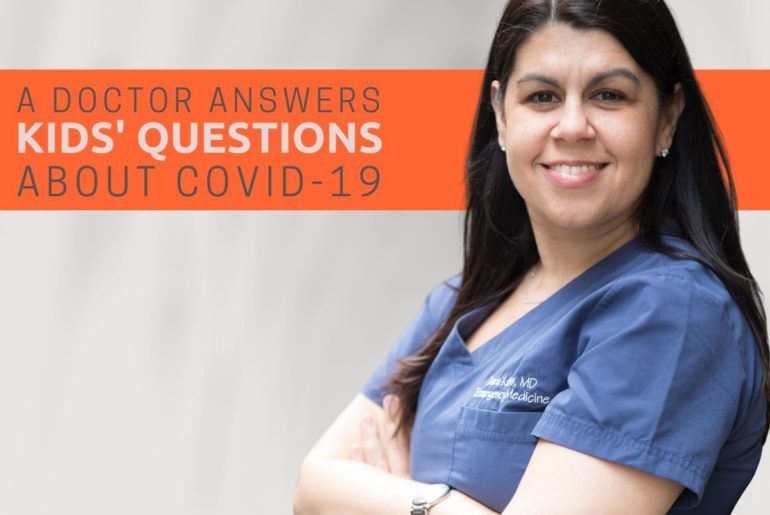Our children have just as many questions as we do about the novel corona virus, but far fewer outlets to ask them. Luckily, we teamed up with Dr. Dara Kass to get some of those questions answered.

Dr. Kass is an emergency medicine physician and Associate Professor of Emergency Medicine at Columbia University Medical Center, and a mother of three. While treating patients during the Coronavirus disease (COVID-19) pandemic, Dr. Kass became infected. Since recovering, she has become a prominent voice educating the public and policymakers about the virus. She was kind enough to sit down with us, virtually, and answer some of the questions your children posed on our Facebook page for parenting in a pandemic.
“Why is it that old and young people (who get the virus) will die fast if they are not taken care of fast?” – Wezi Francis, age 15
Dr. Kass: “Older people and younger people are not the same when it comes to this virus. They have different risk factors that determine whether they will have mild or severe cases. One of the reasons older people have more severe cases is because they are more likely to have pre-existing conditions, like heart disease or diabetes. Younger people tend to do much better with the virus, with people 18 or younger having mild or even asymptomatic cases. In fact, children who have allergies have been correlated to a decrease in symptoms and severities.”
“Why can’t I go to the store with my mom?” – Livi, age 6
Dr. Kass: “So, it’s not really about you personally not going to the store, Livi — it’s about decreasing exposure. We want as few people going to the store as possible. The fewer people in the stores – maybe just one person per family – the less risk of catching and spreading the virus. Grown-ups are also better at not touching their faces, touching each other, and at wearing masks in public, and this also helps lower risk.”
“When will I be able to play with my friends again?” – Orion, age 8
Dr. Kass: “Hopefully soon, Orion. But it might not be the way we used to play before. I think you’ll be able to hang out in person pretty soon, but not to wrestle or play tag. We need to learn more about how the virus is transmitted, and how to treat it and prevent it. Until then, we can hopefully start being together again, but not in the close way we were doing things before.”
“If no one is coughing, do we have to wear masks?” – Isadora, age 3
Dr. Kass: “The reason we wear masks when we cough is because our coughs can send the virus really far and get someone else sick. But did you know you know you can spread the virus when you talk, because you spit when you talk? That’s a little gross, right? It’s one of the reasons that people shouldn’t talk on cell phones in public without wearing a mask. When you speak, you can spread spit right in front of you. And that might get someone else sick or get you sick if you are close to someone else. That’s why we wear masks even when we’re not coughing.”
“Is it safe to meet a friend and walk together, if we stay 6-feet apart? What about playing a game, like catch, where you’re far apart but touching the same ball?” – Zoe, age 15
Dr. Kass: “That’s exactly the thought pattern we want to have right now. Walking 6-feet apart while wearing masks is the safest way to gather and be with a friend If you are very aware of touching your face (and try not to) and then wash your hands after, then playing catch or a game with the same ball is low risk. We have to have a new approach in how we think about engagement where we assess the risks for every connection and then manage those risks.”
“Was the virus’ spread to humans really related to a man eating a bat?” – Samson, age 16
Dr. Kass: “We don’t know. This virus was in bats and now is in humans. It’s important to know how it is transmitted to humans for the next time, but it’s far more important to understand how we protect ourselves and each other, and how we decrease cases. When we place focus on how it started, it takes energy out of how to stop the spread right now.”
“Will the virus go away now that it’s getting nicer outside?” – McKenna, age 12
Dr. Kass: “No. The weather itself and the virus are not connected. Being outside is better than being inside because we’re further apart, so we don’t give germs to each other as easily. But the virus won’t go away in the summer, although we might see a decrease in transmission and cases. And part of this decrease will also be because we’ve learned a new normal in how we engage with friends and family.”
“If you got COVID19 and got well, can you get sick from it again?” – Charlotte, age 12
Dr. Kass: “Probably not. We don’t know enough to give definite answers about this virus yet (no one knows enough to do that yet). But when people make antibodies to fight a virus, those antibodies should protect us from getting it again. What we don’t is how well they will protect and for how long. Understanding that is the first window into making a good vaccine, and that’s what a lot of smart people are working on now.”







